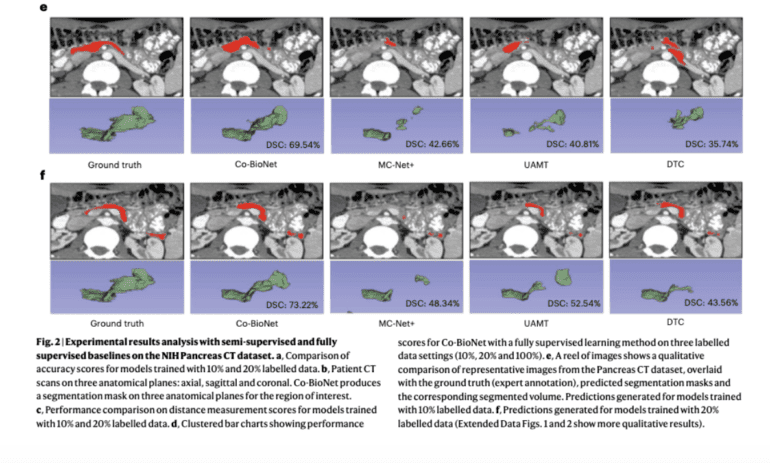TL;DR:
- Monash University’s researchers developed Co-BioNet, an adversarial AI system for medical image analysis.
- The system employs a “dual-view” approach, combining AI-generated labels with human-annotated scans to enhance accuracy.
- By incorporating critical networks and uncertainty, the AI system improves medical image segmentation.
- Co-BioNet outperforms state-of-the-art baselines in semi-supervised learning, requiring fewer human annotations.
- The system holds promise in revolutionizing medical image analysis, enabling more accurate diagnoses and treatment decisions.
Main AI News:
In the fast-evolving landscape of medical artificial intelligence, deep learning has played a pivotal role in advancing diagnostics and patient care. However, a significant hurdle persists – the requirement for vast amounts of annotated data during the training process. The arduous task of human annotations, coupled with potential biases in image segmentation tasks, poses challenges that need innovative solutions. Recognizing this bottleneck, researchers at Monash University have risen to the occasion, proposing an ingenious adversarial learning approach to transform medical image analysis.
At the heart of their pioneering system lies a “dual-view” AI mechanism that directly addresses the limitations of conventional medical image annotation techniques. One component of the system emulates the expertise of radiologists, labeling medical images with precision, while the other evaluates the quality of AI-generated labels by comparing them against limited annotated scans provided by human experts. This unique interplay between the two components not only enhances accuracy but also achieves remarkable results in the realm of semi-supervised learning.
The traditional reliance on manual human annotations for medical scans has been a time-consuming and subjective process, often leading to errors and delays in patient treatments. Moreover, contouring anatomical structures in medical images presents further challenges due to low-contrast slices and ambiguous regions. Monash University’s adversarial AI system disrupts this norm, allowing AI models to make informed decisions with only a fraction of the human annotations typically required.
The key to the system’s efficacy lies in the use of critic networks, enabling each view of the AI system to learn from the high-confidence predictions of the other theory. By incorporating uncertainty into the process, the AI system can accurately measure the quality of its generated labels, significantly improving the accuracy of medical image segmentation.
In rigorous experiments, the researchers compared their method against state-of-the-art baselines using four public datasets encompassing multiple modalities, such as computerized tomography (CT) and magnetic resonance imaging (MRI). The results were nothing short of impressive, with the proposed semi-supervised approach outperforming competing baselines and achieving competitive performance compared to fully supervised methods. Utilizing a mere 10% labeled data led to an average improvement of 3% across three publicly accessible medical datasets, showcasing the efficiency of the uncertainty-guided co-training framework in generating plausible segmentation masks.
Monash University’s groundbreaking AI system represents a paradigm shift in medical image analysis. With AI models making informed decisions and validating assessments, the potential for more accurate diagnoses and treatment decisions is immense. The commitment of the research team to ongoing improvements, such as expanding the application to different medical images and developing a dedicated end-to-end product for radiologists, underscores their dedication to advancing healthcare through AI technology.
Conclusion:
Monash University’s Co-BioNet represents a significant breakthrough in medical image analysis. The innovative “dual-view” approach, utilizing adversarial AI and semi-supervised learning, offers a promising alternative to laborious human annotations. With the potential for more accurate diagnoses and streamlined healthcare processes, this advancement has the power to disrupt the medical imaging market. As AI technology continues to evolve, Co-BioNet’s impact is likely to shape the future of medical diagnostics and improve patient outcomes, presenting opportunities for businesses to invest in and leverage AI-driven solutions in the healthcare sector.

